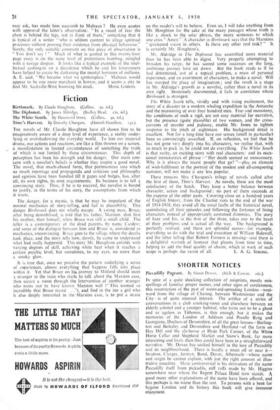Fiction
THE novels of Mr. Claude Houghton have all shown him to be imaginatively aware of a deep level of experience, a reality under- lying or overshadowing the everyday world. To him our material drama, our actions and reactions, are like a film thrown on a screen, a manifestation in limited circumstances of something the truth of which is not limited by those circumstances. This depth of perception has been his strength and his danger. Our main con- cern with a novelist's beliefs is whether they inspire a good novel. The novel, that much-abused form, that portmanteau into which so much reportage and propaganda and criticism and philosophy and egotism have been bundled till it gapes and bulges, has, after all, its own rights, its own requirements. Its business is to tell a convincing story. Thus, if he is to succeed, the novelist is bound to justify, in the terms of his story, the assumptions from which it starts.
The danger, for a mystic, is that he may be impatient of the normal mechanics of story-telling, and fail in plausibility. This danger Birthmark does not wholly escape. A }oung man, Bruce, after being demobilised, is told that his father, Marston. shot first his mother, then himself, when Bruce was still a small child. The teller is a contemporary of the dead parents, by name Cardew; and some of the dialogue between him and Bruce is, considered as mechanics, unconvincing. Bruce goes to the village where the deaths took place, and the story tells how, slowly, he came to understand what had really happened. This story Mr. Houghton unfolds with varying degrees of skill, achieving white heat when it reaches a certain psychic level, but sometimes, to my eyes, no more than a smoky glow.
It is true that, once we perceive the pattern underlying a series of everiences, almost everything that happens falls into place within it. Yet that Bruce on his-journey to Milford should meet a stranger in the train who starts to talk about the Marston case, then secure a room through the intervention of another stranger who turns out to have known Marston well 1" This seemed so incredible that Bruce stared . . ."), and find in the inn a girl who is also deeply interested in the -Marston case, is to put a strain
on the reader's will to believe. Even so, I will take anything from Mr. Houghton for the sake of the many passages whose truth is like a shock to the solar plexus, the many sentences to which one cries " Amen." -A character in Birthmark says that the Marstons " quickened vision in others. Is there any other real task? " It is certainly Mr. Houghton's.
Mr. Aldridge in The Diplomat has assembled more material than he has been able to digest. Very properly attempting to broaden his range, he has scored some successes on the long, ambitioiks journey here set down. But the book reads as if he had determined, out of a topical problem, a mass of personal experience, and an assortment of characters, to make a novel. Will has usurped the place of imagination ; and the result is a stage in Mr. Aldridge's growth as a novelist, rather than a novel in its own right. Immensely documented, it fails in conviction where Birthmark is strongest.
The White South tells, vividly and with rising excitement, the story of a disaster to a modern whaling expedition in the Antarctic and the marooning of over four hundred men. Fear and monotony, the conditions of such a vigil, are not easy material for narrative, but the presence (quite plausible) of two women, and the cross- currents of murder and jealousy, enable Mr. Innes to tighten suspense to the pitch of nightmare. His background detail is excellent. Not for a long time have our senses (smell in particular) been so convincingly assaulted. If, on reflection, we feel that he has not gone very deeply into his characters, we realise that, with so much to pack in, he could not do everything. The White South is that rarity, an exciting story with real characters: and its occa- sional immaturities of phrase—" Her death seemed so unnecessary. Why is it always the nicest people that go? "—plus an element of wish-fulfilment in the portrait of the modest and all-conquering narrator, will not make it any less popular.
There remains Mrs. Charques's trilogy of novels called after the first of them, Time's Harvest. As novels, these are the most satisfactory of the batch. They keep a better balance between character, action and background ; no part of them succeeds at the expense of the other parts. Covering close on a hundred years of English history, from the Chartist riots to the end of the war of 1914-1918, they avoid all the usual faults of the historical novel, assimilating all their episodes and following the fortunes of living characters instead of appropriately costumed dummies. The story of Jane and Jos, in the first of the three, takes one to the heart of their problems and is actual all the way. The background is perfectly realised, and there are splendid scenes--for example, everything to do with the trial and execution of William Bidewell, and the letter telling that Robert Furness is missing—and there is a delightful warmth of humour that gleams from time to time, helping to add the final quality of charm, which in work of such
scope is perhaps the rarest of all. L. A. G. STRONG.






































 Previous page
Previous page